0 Summary
Cross-posted from the High Impact Engineers blog. The Google Doc version of the report can be found here. The Google Sheets of the data is here.
This report analyses the (physical) engineering jobs posted on the 80,000 Hours job board from October 2022 to February 2024. We find that:
- The rate of new jobs added to the 80,000 Hours job board remains consistent throughout this period.
- The rate of new engineering jobs added to the 80,000 Hours job board more than doubled in July 2023 and has remained at this higher level since then.
- Half of the engineering jobs advertised on the 80,000 Hours job board are in biosecurity.
- For the engineering jobs on the 80,000 Hours job board, mechanical engineering skills are the most in-demand, followed by bioengineering.
- Almost half of the engineering jobs are US-based, and nearly a third are UK-based. The rest are mainly in Europe or Australia, with a handful based in India and other non-Western countries.
1 Introduction
1.1 Context
Before October 2022, the “Engineering” job tag on the 80,000 Hours job board included both software and “physical”[1] engineering. We spoke with 80,000 Hours to separate software and “physical” engineering into two different tags, which they implemented in October 2022. This has been a huge help for the High Impact Engineers community. At that time, I set up email notifications to receive alerts when new jobs were posted to the 80,000 Hours job board using the “Engineering” job tag.[2]
Speaking with other career coaches and community builders, there is a consensus that there is a general lack of information on the landscape of “EA jobs”. Out of curiosity, I put this analysis of engineering jobs on the 80k job board together in ~8 hours. I expect 80k is probably in a better position to run these kinds of evaluations of the landscape of impactful jobs, but I thought that it would be helpful and of interest to the High Impact Engineers community and potentially the wider EA community to see these statistics. I focus only on jobs tagged “engineering” on the 80k job board, but I expect similar analyses could be made with other tags.
After putting this report together, I shared it with Conor Barnes from 80,000 Hours to review. All the notes from 80k are from his feedback, which is greatly appreciated!
1.2 Some Caveats
Since I received these notifications via email over the past 15 months, most of the jobs from the notifications are no longer open. This means that the “Type of engineering” and the “Country” data are the most likely to be inaccurate without access to the original job description. I have made my best guess to fill in this data according to the job titles, trying to find similar open roles at the companies, and doing general research on the organisations’ websites.
I have tried not to delete these email notifications, but I may have deleted some. As a result, this data set may be incomplete. However, I don’t think this detracts too much from many of the conclusions that can be drawn from this set of data.
Finally, here are some caveats on my views on the 80k job board. I’m sure they would agree with me that their job board is not the definitive list of impactful jobs, or even the definitive list of EA jobs (whatever that means!). They do a great job at keeping on top of opportunities within and outside of the EA ecosystem, but it’s important to keep in mind that there are lots of other impactful jobs that 80k might miss, or they might have a different model of impact than you do[3]. As a result, I hope that readers will understand that this is not a reflection of the jobs that “EA” deems to be “valuable”[4], but more an attempt to understand the opportunities advertised via 80,000 Hours and perhaps pinpoint any blind spots (for both 80k and High Impact Engineers).
2 Analysis of Engineering Jobs on the 80,000 Hours Job Board
2.1 Data
I gathered the data on engineering jobs from the notification emails, and the data on all new jobs and the total number of jobs were pulled from the fortnightly (now weekly!) update emails from the job board team. All the data I have are on this spreadsheet.
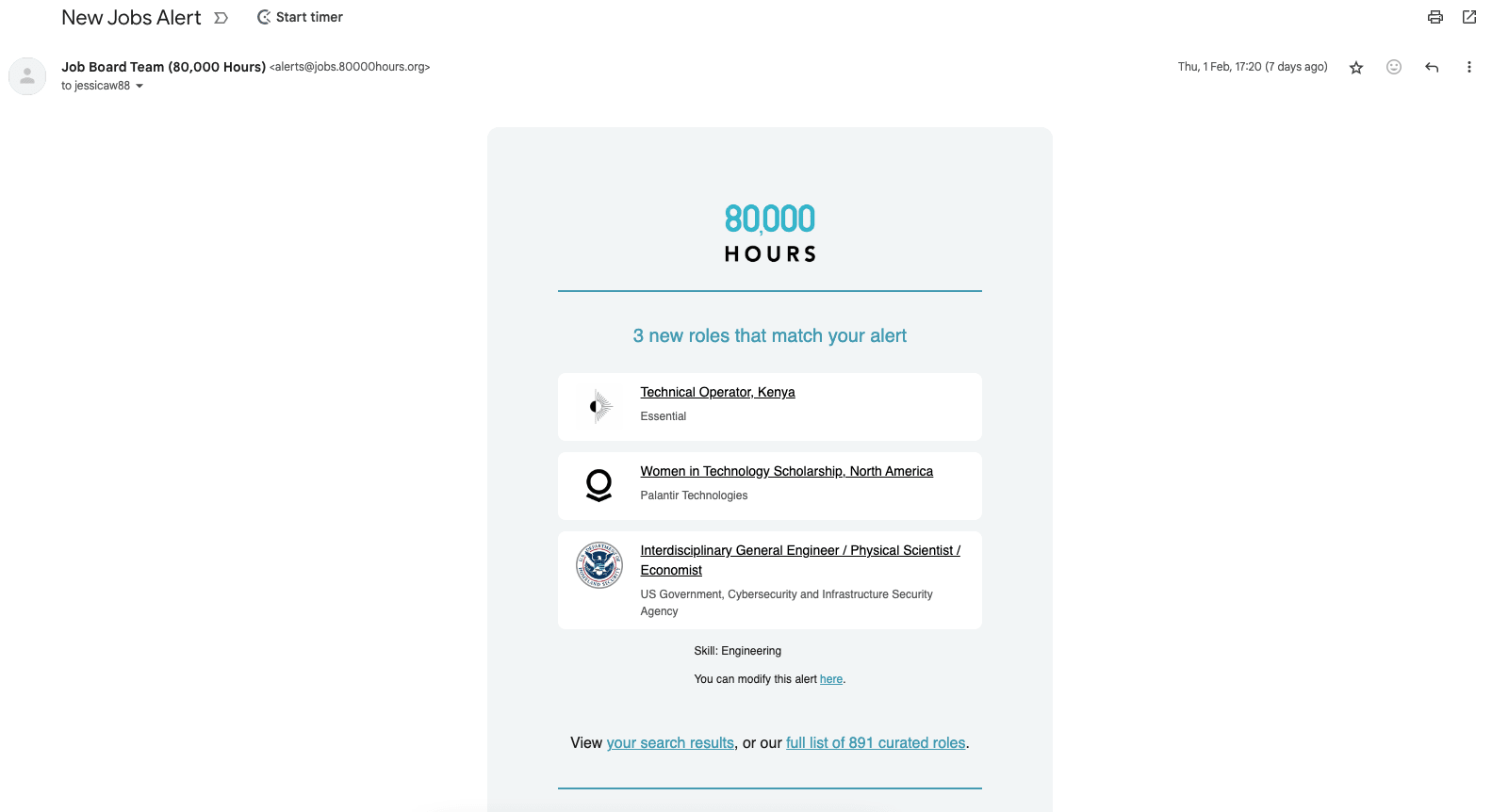

2.2 All Jobs on the 80k Job Board
Plotting the number of new jobs and the total number of jobs gives us a baseline for the number of jobs on the 80k job board.
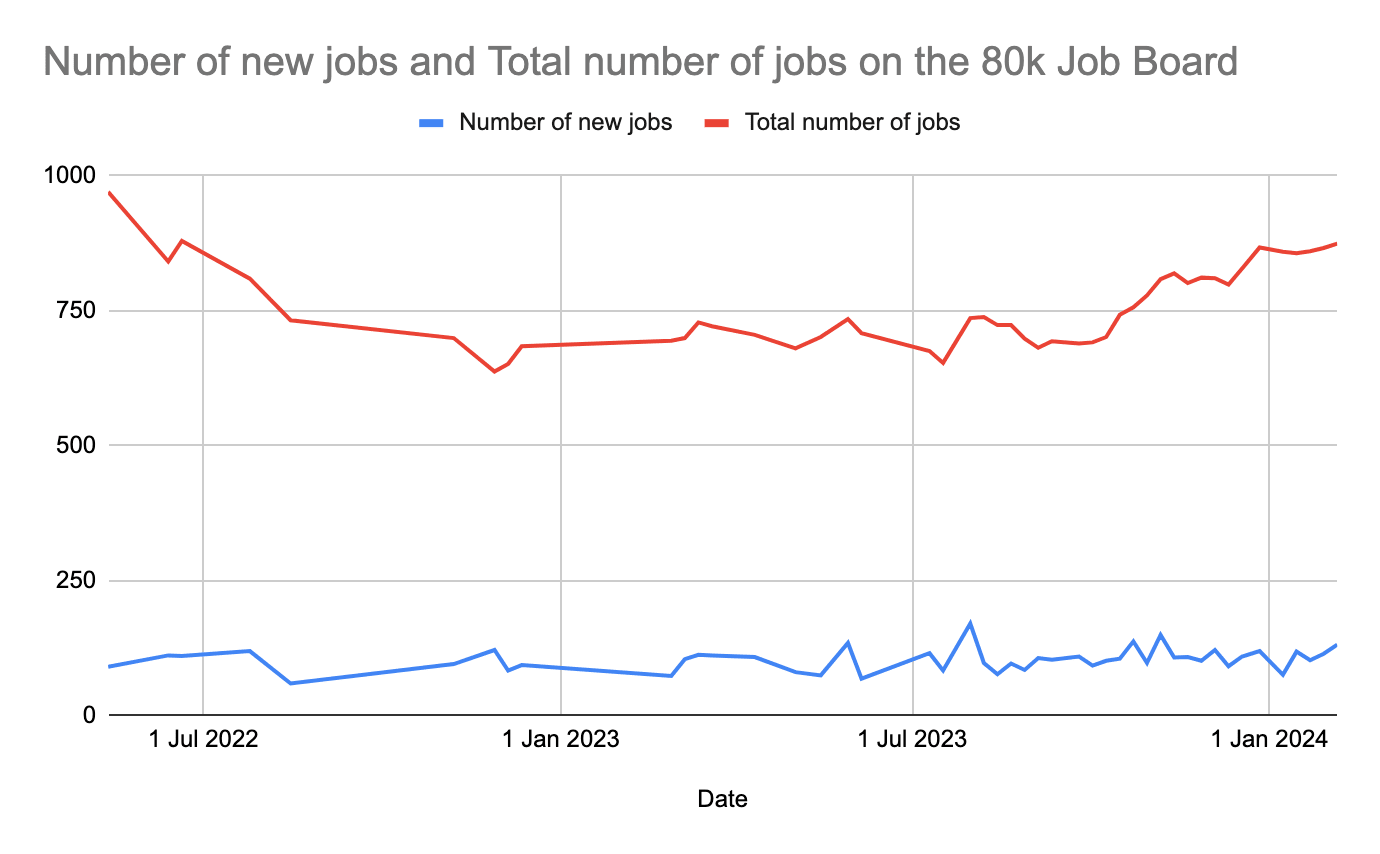
In the period from May 2022 to February 2024, the total number of jobs and the number of new jobs has stayed pretty consistent across time, i.e. the number of new jobs falls mostly between 80 and 110, and the total number of jobs on the job board consistently falls between 680 and 880 jobs.[5]
2.3 Number of Engineering Jobs Posted by Month
Gathering this data was the original reason why I kept the email notifications. I thought it might be useful to validate one of the assumptions that we made when setting up High Impact Engineers: that “the demand for engineering expertise in EA will grow over the next 10 years”. Although we have not been around for 10 years yet, this data already shows that the demand for engineering expertise in EA has increased over the last 15 months.
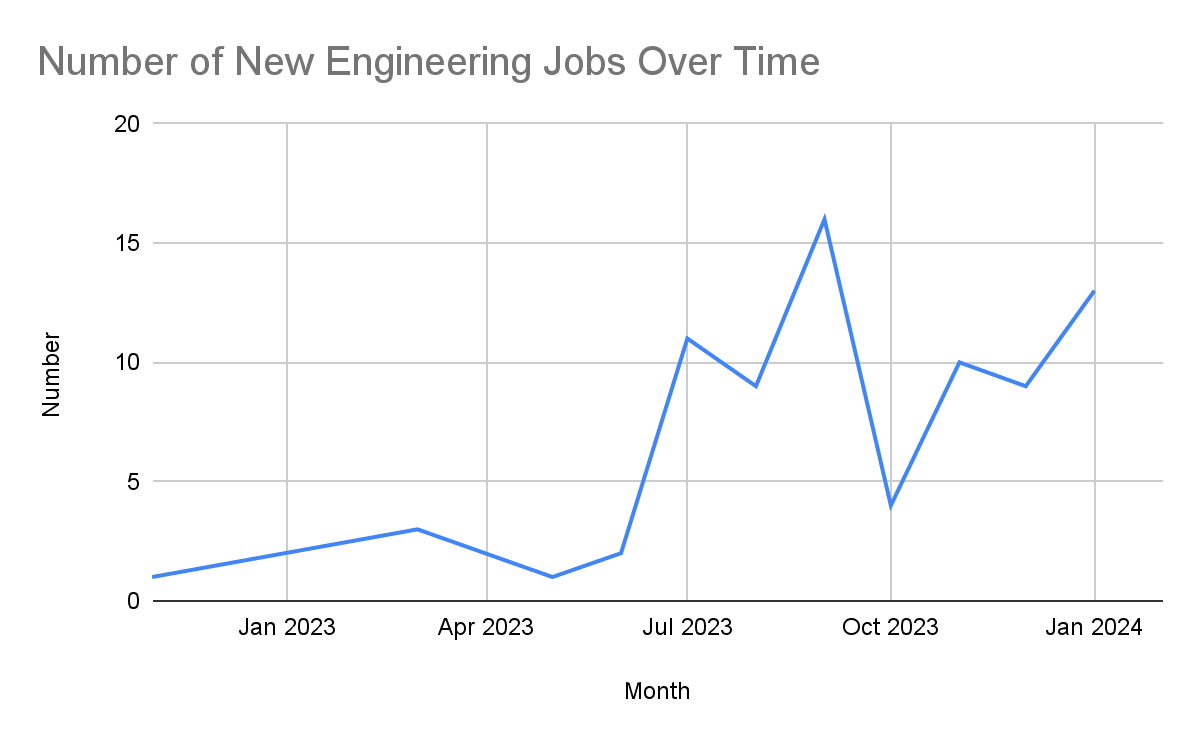
Although the data is a little spiky due to the likely manual and sporadic nature of finding jobs for the 80k job board, it still indicates that there was a significant increase in engineering job postings from <5 per month before July 2023 to around 10 per month from July 2023 onwards. The trend has remained high since, and I expect that this will continue to be the case (if not increase over time).
There are several possible reasons for this trend.
- 80k could have increased their capacity and added more new jobs from July 2023 onwards, so the engineering jobs increased in number but the proportion of engineering jobs stayed the same.
Figure 5: Plot of the proportion of engineering jobs on the 80k job board over time
- As noted in section 2.2, the number of new jobs added to the job board remained relatively steady from July 2023.
- This suggests to me that more attention has been given to engineering jobs specifically, or something correlated with engineering.
- I systematically deleted the notification emails from before July 2023.
- I don’t believe that I have been systematically deleting the notification emails before July 2023, as I still have many of the other emails from 80k from that time period. However, it is possible that this is the reason why the number of engineering job notifications is higher after July 2023.
- I’m 85% sure I haven’t been systematically deleting these emails. If anyone else has kept their engineering job notification emails from before July 2023, it would be helpful to cross-reference this data!
- More impactful engineering roles suddenly appeared after July 2023.
- I think this is highly unlikely – many of the (engineering) organisations featured on the job board have been around for a lot longer than July 2023 and have probably been doing impactful work and advertising for engineering jobs before that; they just didn’t get featured on the 80k job board until more recently.
- There has been an increase in awareness and understanding of what kinds of engineering roles are impactful, so more of these roles appear on the job board.
- This increase in awareness could be due to more established research in cause areas such as technical biosecurity and compute governance, leading to a better understanding of the concrete problems and bottlenecks in these areas.
- The organisations/companies working on these bottlenecks can then be identified and relevant jobs advertised.
- From 80k: “In June / July 2023 we pushed on finding technical biosecurity roles and organisations. Naturally, this included engineering roles.”
- This matches up: all the engineering job notifications from June and July 2023 were for technical biosecurity roles.
- This is the most likely reason why there was a large increase in engineering roles being advertised on 80k’s job board.
The push on finding technical biosecurity roles is what has resulted in more than double the rate of engineering roles appearing on the 80k job board. I think that this will help wider EA community to better appreciate and understand the role of engineering in helping to solve the world’s most pressing problems. I believe that as we learn more about different cause areas, we will continue to be able to engineer solutions to tackle them.
2.4 Engineering Jobs by Cause Area
I categorised each of the engineering jobs by their cause areas.
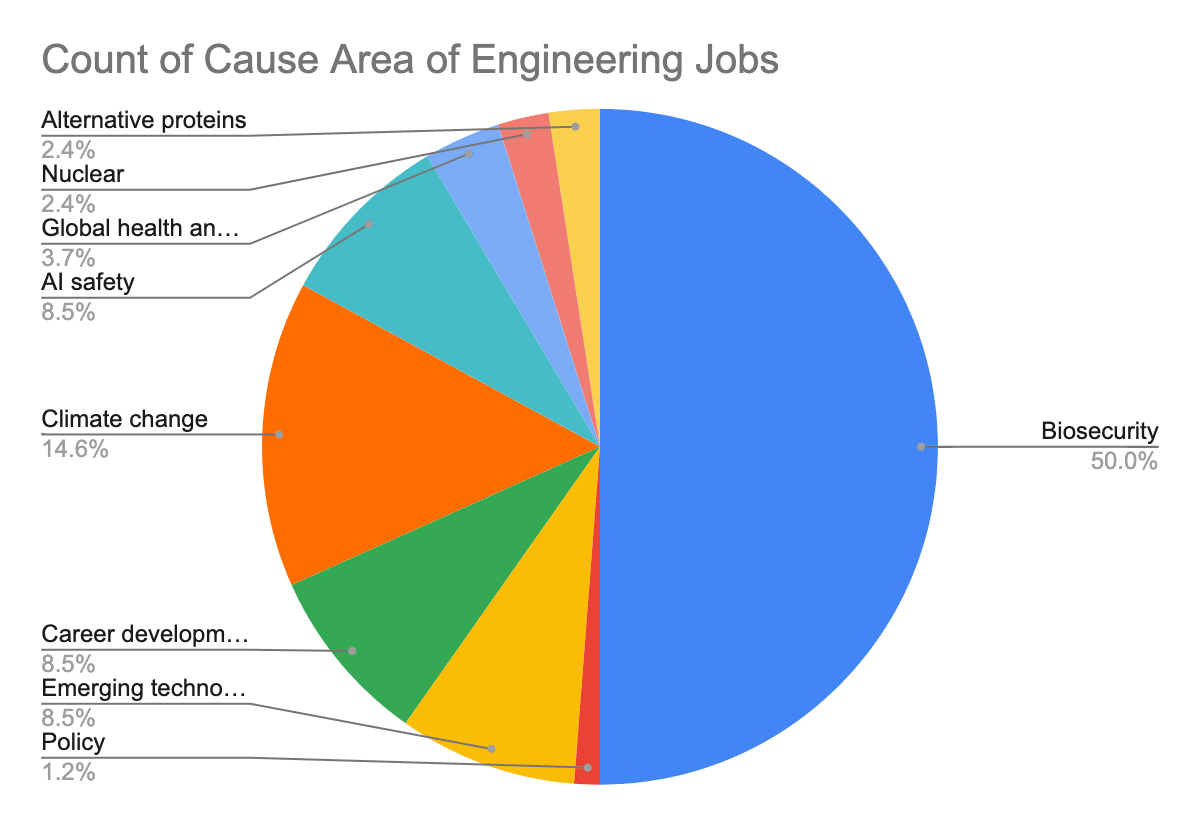
Half of the engineering jobs posted were for biosecurity, which was a larger proportion than I was expecting, but I did expect this cause area to be the largest segment. (This is explained by the push by 80k to include more technical biosecurity roles.)
The emerging technologies cause area jobs were usually somewhat related to AI safety, but I labelled them separately because they often also covered other emerging technologies like biotech or neurotech. Combining them (AI safety + emerging technologies) results in the second largest segment, but a few of the AI safety jobs labelled engineering might be better suited in the software engineering label[6]. 80k note that they expect to be listing more opportunities in technical AI governance (e.g. compute governance), which benefit from an engineering skill set.
The lack of alternative proteins jobs was a little disappointing but understandable – Tälist has a comprehensive job board dedicated to alt proteins jobs, so fewer people would probably come to 80k for jobs in this industry. 80k links to the GFI alt protein database and regularly republishes it. It’s important to note that there are many engineering jobs in alt proteins, and this pie chart provides a somewhat longtermism-skewed selection of impactful jobs. 80k also mentioned that it’s unclear how to prioritise amongst the many different alt proteins roles.
I was (pleasantly) surprised to see more climate change jobs appearing from around December 2023 onwards, considering that it is common in EA to encourage working on more neglected cause areas. It is much easier for engineers to work on climate change because there are more concrete bottlenecks and solutions to tackle.[7]
I think there are more opportunities for engineers to contribute to nuclear disarmament and civilisation resilience than are shared via the 80k job board. I’ve included a lot of those opportunities in our monthly newsletter.
In summary, the current landscape of engineering jobs on the 80k job board suggests that there is a high demand for engineers to work in biosecurity, but I think there are many missing opportunities in other cause areas.
2.5 Engineering Jobs by Engineering Discipline
Categorising engineering jobs by the relevant engineering discipline(s) was hard for 2 reasons:
- Engineering disciplines have a lot of overlap and sub-types, and I often find it hard to tell some engineering disciplines apart.[8]
- Jobs are often multidisciplinary.[9]
As a result, I often assigned multiple engineering disciplines that seemed relevant to each job. A bar chart therefore shows the relative proportions of engineering disciplines better than a pie chart (because the engineering disciplines are not mutually exclusive).
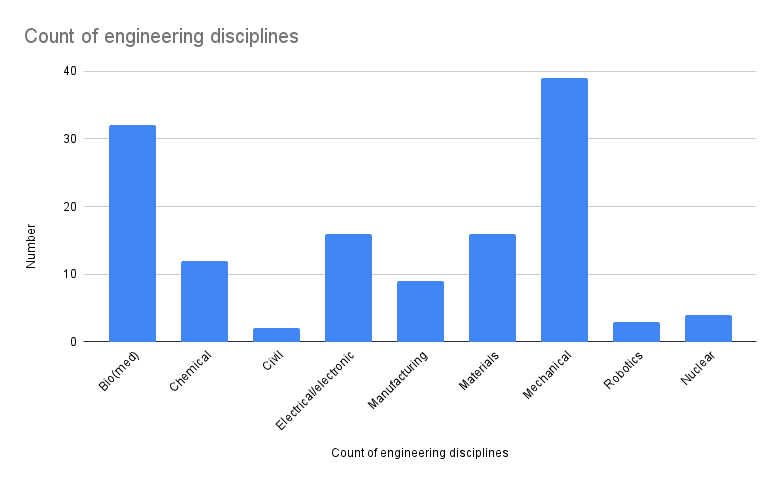
Unsurprisingly, mechanical engineering makes up the largest proportion of engineering disciplines. This is because mechanical engineers are the most flexible in terms of their skillset and knowledge.[10]
Since biosecurity makes up 50% of the jobs by cause area, bio(medical) engineering is in high demand. However, there are still opportunities for all kinds of engineers! I expect the proportion of electrical/electronic, materials, and potentially manufacturing engineering jobs to increase as 80k add more technical AI governance roles in the future.
2.6 Engineering Jobs by Country
Out of interest, I gathered data on where these jobs were based.
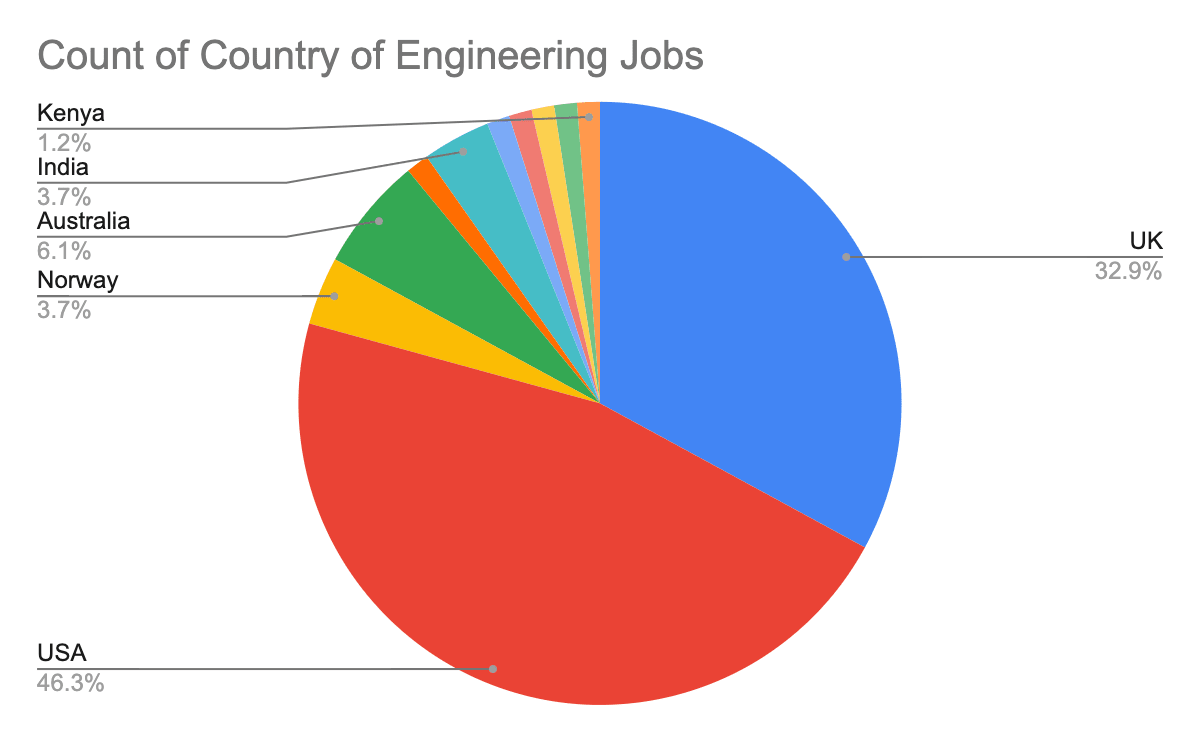
I had to guess many of the locations of these roles using the locations of the organisations that were advertising, but I think this is fairly representative. It is sad but unsurprising that over ¾ of all the jobs are based in the US or UK, and very few (<10) are based outside of the West. Even jobs in Europe are very underrepresented, despite having many organisations working on EA-aligned cause areas. This makes it difficult for our members based in places such as India, Mexico, Poland, etc. to meaningfully contribute to EA causes, or even to stay motivated. It seems unlikely that 80k has found all the impactful non-US/UK roles.
3 Conclusion
3.1 Main Takeaways
Even if the data collected here is incomplete, some meaningful conclusions can still be drawn. The current landscape of impactful engineering jobs advertised on the 80k board has a heavy skew towards biosecurity, and as a result, mechanical and bio(medical) are the most common types of engineering jobs on the job board.
Many of the jobs on the 80k board require engineers to be able to work from the US and UK, and there are also some positions based in Europe and Australia. Very few of 80k’s advertised engineering jobs are based outside the West.[11]
We can also conclude that people with engineering skills will continue to be needed to tackle the world’s most pressing problems, whether by working directly on solutions and bottlenecks or advising policy to address challenges from emerging technologies. High Impact Engineers will continue encouraging and helping our members to plan impactful careers in these areas. If High Impact Engineers does more outreach outside of EA, reaching engineers in the biotechnology or pharmaceutical industries will probably be a higher priority if we want to fill these biosecurity roles; if there is a need to fill more technical AI governance roles, then we would reach out to engineers in the semiconductor industry.
3.2 Recommendations
This analysis shows that the engineering jobs on the 80k job board lack diversity along several axes: cause area, geographical location, and engineering discipline. As a community, we can contribute by recommending more diverse engineering jobs through this form.
3.3 Further Work
If anyone can cross-reference the number of jobs with the engineering tag over time, that would help update credence in my analysis in section 2.
I will continue to collect data from the 80k emails to increase my understanding of the landscape of engineering jobs and how it will continue to change. I think 80k is in the best position to conduct these kinds of analyses, ideally also for other fields like software engineering, so that the wider EA community can understand the landscape of jobs in EA cause areas.
Other data I would be interested to gather from the 80k job board include:
- How many people applied for each position
- How many of the candidates chosen were referred from the 80k job board
- How 80k evaluate which jobs are added to the job board (note: this is answered on their FAQ)
Ideally, I would have a fully integrated job board pulling engineering jobs from this 80k job board, the Tälist job board, the Effective Thesis job board, the EA Opportunities job board, and perhaps some climate change job boards like Climatebase[12]. This would give me more of an overview of the job landscape in EA cause areas and make my role at High Impact Engineers a lot easier, but this is not a trivial task!
Many thanks to Hugh Irving and Conor Barnes for their feedback.
- ^
i.e. non-software. Examples include mechanical engineering, chemical engineering, etc.
- ^
I’ll refer to 80,000 Hours as 80k from here onwards.
- ^
i.e. include jobs that you don’t think are impactful or leave out jobs you believe are impactful
- ^
I use scare quotes because those terms are difficult to define and defining them is definitely outside the scope of this report.
- ^
These numbers are very impressive: maintaining a job board is really hard. Jobs open and close all the time; they don’t have a consistent layout or formatting so scraping data automatically is really difficult; and that’s not even to mention trying to evaluate whether a job or organisation passes the bar for impact to be worth advertising! The team at 80k has done a phenomenal job at maintaining such a large and divergent job board.
- ^
E.g. there were a couple of Anthropic jobs that a physical engineer could technically do but would probably be better suited to software engineers.
- ^
I will note, however, that a lot of engineers who care about social impact want to work on climate change, so the counterfactual impact for an engineer to take a role in climate change is often lower than working on other less well-known cause areas.
- ^
E.g. can someone explain to me the difference between manufacturing engineering and industrial engineering?
- ^
Your role is to solve a problem, which can often be done most efficiently by employing different toolkits from different engineering disciplines.
- ^
They often need to learn about all the other disciplines through formal education.
- ^
If, for example, you were to compare this distribution to the engineering jobs on Tälist’s alternative protein job board, you would find that those jobs have much more geographical diversity.
- ^
I have already synced to their Airtable databases but haven’t been able to standardise the data very easily. HI-Eng has put together a list of other job boards in impactful cause areas, and 80k also lists some in their FAQ.

Thanks for the post Jessica!
I want to ask a tangent question. So I'm thinking about becoming a computer hardware engineer after using 80k's planning process. Then I need to learn about things like what day to day is like, what tasks create value in the job, and other relevant info that help me predict my fit in that area. 80k doesn't have such resources. What are some comparable resources you can point to?
Thanks!
Apologies, only just saw this! Computer hardware engineering definitely seems like a very worthwhile and impactful career choice. Some resources on becoming a computer hardware engineer:
- What does it mean to become an expert in AI hardware? – EA Forum
- Lennart Heim's resources (he used to be a computer engineer and now works at RAND. HI-Eng also interviewed him in our podcast, where we discussed his career trajectory)
- Onni Aarne's writeup on advice and resources for getting into compute governance
Hope these are useful! Feel free to book a career conversation with us to chat more about your career plans and we can go further in depth :)
Thanks a lot Jessica! Let me look into these. BTW I reply pretty late too!
Excellent post Jessica, and intriguing! On the point about jobs outside the West, I would be curious to learn more if anyone has looked into it:
-A lot of outbreaks of disease happens in poorer countries - could there be opportunities to deliver engineered disease management tools in these locations? Might even overlap a bit with AIM/CE work.
-What about engineering work on semiconductors and/or chips? I am super naive about this but would guess Taiwan and the Netherlands would also be potential locations to have lots of impact as an engineer?
I also have a question which is more personal:
-As a mech eng myself I am curious about the mapping of engineering disciplines to cause areas? I would naively think that mech eng maps onto CC and nuclear, while bio eng maps more onto biosec and alt proteins.
Thanks for your comment Ulrik! Some thoughts on your bullet points:
- I think there probably are opportunities to do biosecurity work in LMICs (e.g. Africa CDC's Biosafety and Biosecurity initiative, the Southeast Asia Strategic Multilateral Dialogue on Biosecurity) but these seem mostly policy-based rather than focused on technical interventions (likely because there's just more private and public money for developing technical interventions in high-income countries).
- 80k mentioned that they would be adding more technical governance jobs (i.e., more roles in semiconductors/chips) in the near future, so hopefully the geographical bias might shift somewhat. However, my intuition is that the US will continue to be a hotspot for jobs in this sector because of the sheer size and concentration of semiconductor companies (and maybe because of the higher likelihood of actually affecting governance/regulations/standards?)
- We did some mapping of engineering disciplines to cause areas, which you can see here and on our Resource Portal (it is by no means comprehensive – we even miss out nuclear!) Turns out mechanical engineers are pretty useful in a lot of cause areas. Hope that's helpful!